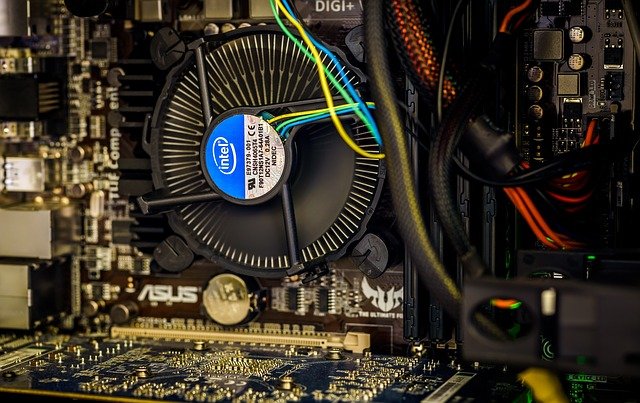How to Clean Pc Fans
It’s critical to maintain your computer clean in order for it to work effectively. Cleaning your computer, however, entails more than simply deleting old files or transferring large data to external hard drives. Physically cleaning your computer, particularly your PC fans, is also necessary. Your computer will slow down or, worse, parts will overheat if there is too much dust and debris on the fans. If your computer overheats and cannot cool down, internal elements of your computer may be harmed.
Almost every component of a computer’s internal hardware begins to warm up as it is turned on. A fan keeps high-frequency and high-temperature exposure to a minimum, preventing damage to your computer.
HOW TO CLEAN YOUR PC FANS:
- Turn your computer off.
- Disconnect your computer from the power outlet as well as the surge protector.
- Remove the computer casing from the PC.
Dust the insides of the computer using compressed air, but keep a few inches away from the motherboard, memory, expansion cards, and processors.
- Use compressed air or an electric vacuum to clean the dust from your PC fans, but be careful not to break the fragile blades. While utilizing compressed air, hold the fan blade with your finger. Wipe the blades clean with a cotton swab soaked in rubbing alcohol to ensure that all dust is removed.
Cleaning your computer every 6 to 12 months will help prevent your computer from overheating or being damaged due to dust and filth. By cleaning your computer on a regular basis, you will not only prevent it from overheating, but you will also be able to tell which parts are wearing down and need to be changed before it’s too late. Cleaning a computer system fan, whether it’s a CPU fan, case fan, or power supply fan, necessitates some caution and the use of the appropriate product. The techniques and tips for cleaning the fans in your computer are listed below to help keep it cool and efficient.
Use compressed air to clean the fans. Cleaning computer fans, or any computer part in general, with canned air meant for electronics is the first option. This bottled air is meant to be static-free, reducing the risk of computer component damage. The safest and cheapest method is to use canned air intended for cleaning electronics.
Use an electric vacuum to clean
A small electronic vacuum or electronic duster is the second option. These devices, like canned air for electronics, are designed to help protect electronics by reducing the likelihood of static production or discharge.
Using a moist cloth to clean the surface
If the computer is near a smoker, the fan can resemble the one in the image on this page. It’s normally preferable to dampen a cloth with water and rub the fan down in this circumstance. We also think it’s important. When using a damp towel, it’s best to remove the computer’s fan.
Cleaning Procedures
Open the computer case and locate the fan you wish to clean once you’ve determined what you’ll use to clean the fans. In most cases, you’ll need to remove the fan to clean both sides of the fan. If your CPU fan is connected to the top of a passive heat sink, you’ll need to remove it to clean it.
After detaching the fan from the computer, use your fingers to hold the fan’s fins in place. The dust can then be blown away using compressed air, sucked up with an electric vacuum, or wiped away with a damp cloth.
Cleaning a computer fan necessitates the application of the proper procedures and products. Whether you’re cleaning a computer fan, a case fan, or an exhaust fan, if you have a power supply fan, you should be aware that regular cleaning is required to ensure that your computer runs smoothly. Your computer fan can become blocked with dust if you aren’t attentive, disrupting your entire operation and giving you a lot of inconvenience as well as unexpected charges. If you’re a player who’s put money into it, you’ll understand what we’re talking about. Mean. You’ll get pc fan cleaning right the first time with our assistance.
Cleaning your computer fan may appear to be a chore, but with our simple step-by-step guide, it will be a breeze but before you begin, remember to follow these guidelines. To avoid being electrocuted, make sure the computer is turned off before opening it. It’s beneficial to be aware of electrostatic discharge and its potential hazards. To save time, prepare the cleaning supplies and produce. Also, to keep the inside of your computer clean, wear protective clothing such as gloves or clean your hands. Make a cool choice. PC fan cleaning should be done in a clean, dry location at home. Check to ensure that the fan’s fins are not rotating. If you skip this step, you risk injuring your fingers or causing serious damage to the fan and its surrounding PC components.
The following are the essential items to have on hand for computer fan cleaning:
It’s possible that dust is causing your computer to function slowly or make a lot of noise while it tries to work. Dust is drawn in by your system’s intake fan along with the fresh air that cools the internal components. The dust then accumulates on the components of your computer, trapping heat. This can lead to overheating if left uncontrolled. While you won’t be able to completely remove this issue, you can surely reduce its severity by cleaning your computer on a regular basis. Depending on your preferences, you should dust your computer every six to twelve weeks to help the environment. Pets and nearby construction are two factors that contribute to increased dust levels. Cleaning your computer can be a dirty process; you’ll want to vacuum up the dust you spewed out. However, your computer will operate faster and the components will last longer.

